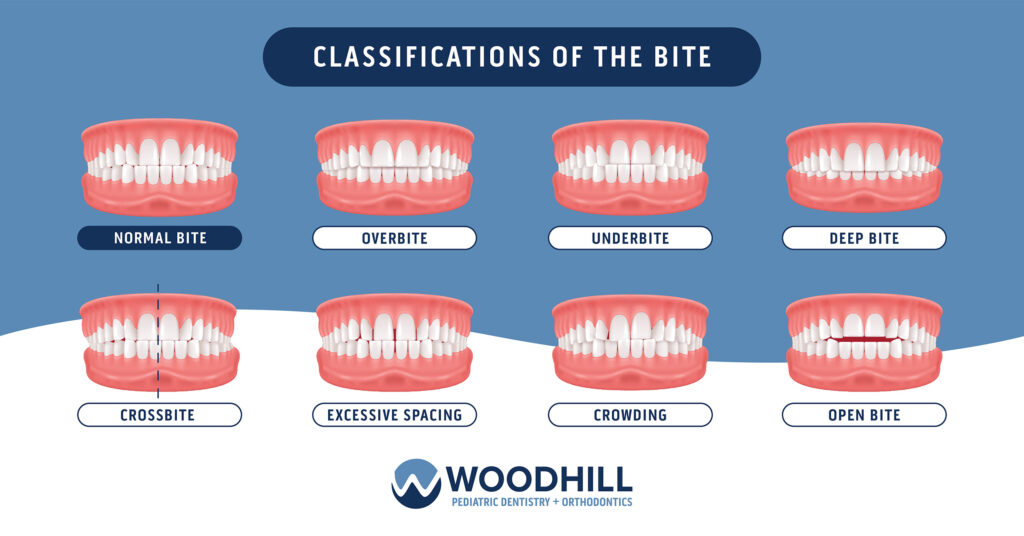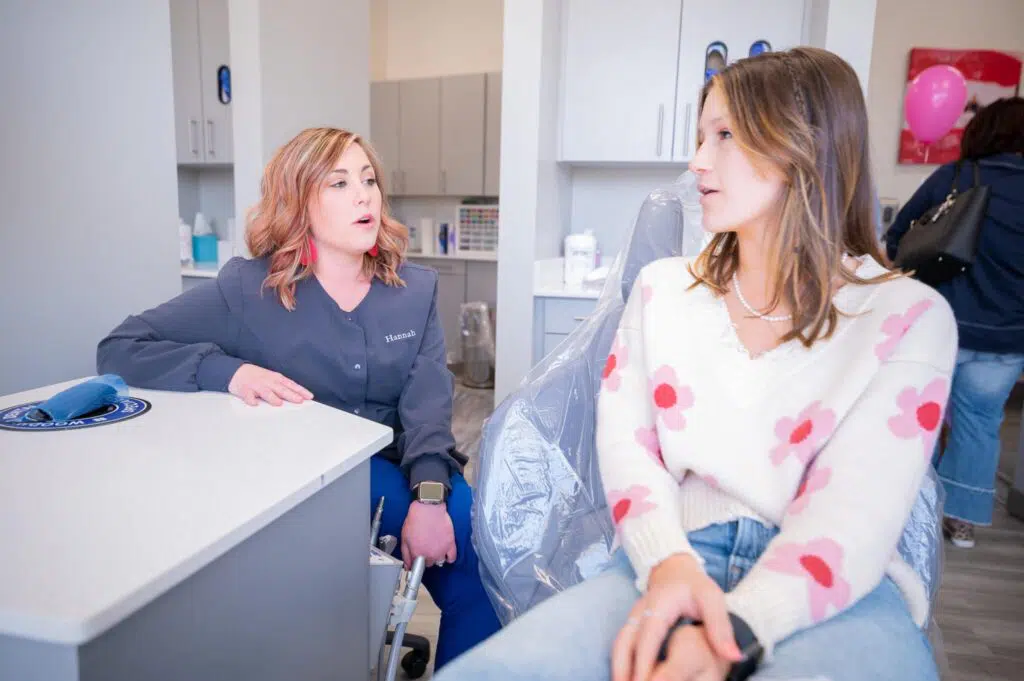You visit the orthodontist, who tells you that you have a Class 2 malocclusion and need braces. But the malocclusion definition escapes you. What is a malocclusion, and how will braces help? What types of dental problems can orthodontics fix?
Woodhill Dental Specialties can fix all types of malocclusions, from overbites to crossbites. We can straighten your crooked teeth or close gaps between them. Whatever malocclusion you have, we can take care of it with braces or clear aligners.
What is a malocclusion of teeth? It’s a fancy way of saying “bad bite.” In other words, your teeth aren’t where they should be and don’t line up properly in your mouth.
A bad bite can cause all kinds of problems, from jaw pain and headaches to speech problems and digestive issues. That’s why consulting with an orthodontist as soon as possible is important to determine what dental issues exist. The American Association of Orthodontists recommends children see an orthodontist by age 7.
There are different types of malocclusions, referred to as classes.

The three classifications of malocclusions can be broken down into additional types of dental problems. In other words, you can have more than one dental problem. For instance, you can have a Class 2 malocclusion (overbite) with crowded teeth, also known as crooked teeth.
Here are the different bite problems we can treat with braces or clear aligners.
When people want to know how to fix an overbite, our first suggestion is braces. Why? Braces have long been the go-to treatment for an overbite, though SureSmile aligners can also treat some overbites. The most severe overbite cases would do better with braces or clear braces. SureSmile aligners are similar to Invisalign treatment, but our aligners tend to be more comfortable and more efficient.
You can fix an underbite with braces or clear aligners. An underbite can give the appearance of a jutting chin. As with other bad bites, fixing your underbite can change the shape of your face, giving it a more symmetrical appearance. Underbites can also make biting and chewing more difficult.
There are two kinds of crossbites: an anterior crossbite and a posterior crossbite. An anterior crossbite involves the front teeth. The center lines between the upper and lower central incisors do not line up. A posterior crossbite has the upper back molars sitting inside the lower ones rather than lining up with them.
A deep bite is similar to an overbite, except the top teeth overlap the bottom teeth. In some cases, the bottom teeth rest against the roof of the mouth behind the upper teeth. They can also hit the back of the top teeth. This can cause mouth sores and excessive tooth wear with biting and chewing.
An open bite involves the front teeth flaring out at an angle, leaving a large gap between the upper and lower teeth. This is sometimes called “buck teeth” because it causes the upper front incisors to stick out, making them look larger than they are. An open bite is often caused by using a pacifier or thumbsucking beyond age 2 or having a tongue-thrusting habit, though there are other causes, such as injury or genetics.
Crowded teeth occur when permanent teeth do not have enough room to erupt correctly after the baby teeth fall out, making your teeth crooked. Crowded teeth can be caused by everything from an undersized jaw to premature tooth loss. Crowded teeth are harder to clean and can cause faster tooth decay. They also can lead to excessive tooth wear. We can correct these issues with a palatal expander and braces or clear aligners.
Gap teeth are the opposite of crowded teeth. Instead of a narrow jaw, a wider-than-normal jaw can lead to gap teeth. Gaps can also happen when teeth are missing from tooth extraction, injury, or falling out prematurely. Other teeth shift to fill the space but don’t completely fill it. Gap teeth can trap food and accelerate tooth decay and gum disease.

It’s important to fix a bad bite because it tends to worsen over time. Left untreated, bad bites can cause more symptoms over time.
These are some symptoms you can experience due to a bad bite. That’s why it’s important to address your dental issues as soon as possible.
Woodhill Dental Specialties has several options to fix your bad bite. Whether you’re a child or an adult, we can fit you with braces or clear aligners to repair your bite.
We offer traditional metal braces, clear braces, and even lingual braces that fit on the back of the teeth and are nearly invisible. We also offer SureSmile clear aligners for those who prefer not to wear braces.
During your first visit, we will take x-rays and digital scans and provide the best treatment plan for your dental issues. You will be amazed at the difference once your clear aligners or braces are off. Our patients have noticed differences not just in their smile but in their entire facial structure. They also find a boost in self-confidence knowing they have that beautiful, straight smile.
If you’re looking for clear aligners or braces in Dallas, TX, or Rockwall, TX, schedule an appointment with Woodhill Dental Specialties. Whatever your dental issues, we can find the best solution to give you the smile you want and deserve!